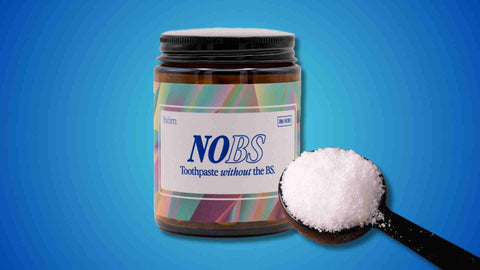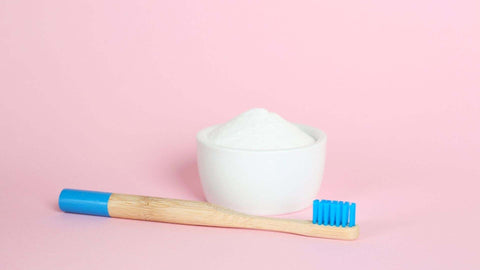Does Baking Soda Remineralize Teeth?
No, baking soda, by itself, does not remineralize teeth.
Remineralization is the process of restoring essential minerals, like calcium and phosphate, back into our tooth enamel. While baking soda is effective for removing plaque and neutralizing acids in our mouths, it doesn't provide the minerals necessary for the remineralization process.
However, baking soda can support our oral health in ways that indirectly benefit the remineralization process. For example, its alkaline nature helps neutralize harmful acids produced by bacteria in plaque, reducing the risk of enamel erosion.
This creates a more favorable environment for natural remineralization to occur, especially if you regularly brush with nano hydroxyapatite toothpaste tablets.
In this article, I'll explain everything you need to know about baking soda for remineralization.
What is remineralization?
Remineralization is a natural process in which essential minerals, primarily calcium and phosphate, are deposited back into the enamel (aka the outermost layer of your teeth). This works to repair and strengthen enamel that has been weakened or damaged by acids and bacteria, ultimately reducing your risk of tooth decay and cavities
While remineralization is a process that can take weeks or months to occur, brushing with nano hydroxyapatite toothpaste for two minutes daily, using expandable floss at least three times per week, and limiting acidic and sugary foods in your diet can help.
Overall, remineralization is a fundamental aspect of maintaining strong and healthy teeth, and it takes not only good oral hygiene practices to achieve but also the use of remineralizing toothpaste and a balanced diet.
How does baking soda work in toothpaste?

Baking soda (sodium bicarbonate) in toothpaste is a gentle-yet-effective cleaning ingredient often included in toothpaste.
Its mild abrasive qualities help scrub away surface stains from your teeth, contributing to a brighter, whiter smile without damaging the enamel. This makes baking soda toothpaste an excellent choice for daily use, especially if you're looking to remove stains caused by coffee, tea, wine, or tobacco.
Further, baking soda's natural alkalinity plays an important role in neutralizing the plaque acids in your mouth. These mouth acids, produced by bacteria as they digest food particles, can erode tooth enamel and lead to cavities.
By keeping the oral environment more balanced, baking soda not only protects your enamel but also supports overall gum health.
Additionally, pure baking soda tackles bad breath by addressing its root cause: the acidic by-products of oral bacteria. By neutralizing these acids, baking soda helps freshen your breath, leaving your mouth feeling cleaner and more refreshed.
For those of us with sensitive teeth, brushing teeth with baking soda toothpaste can be a gentler alternative, effectively cleaning without causing discomfort.
So, is baking soda toothpaste effective?
Yes, baking soda toothpastes can be effective, particularly for breaking up plaque biofilm and removing surface stains on your teeth.
Baking soda's mild abrasive properties help gently polish your teeth which will clean your mouth and gentle remove stains from the tooth surface without damaging your enamel.
Additionally, its alkaline nature can help neutralize the acids produced by oral bacteria, reducing the risk of enamel erosion and promoting a healthier oral environment.
That said, it's not enough just to mix baking soda with water and call it a day. There are other important ingredients in your toothpaste that provide benefits you just can't get with baking soda.
For example, nano-hydroxyapatite is a powerful ingredient that mimics that natural composition of our teeth and can remineralize enamel. Also, xylitol fights acid-creating bacteria and prevent tooth decay.
Without these other important ingredients, baking soda toothpaste is not effective enough to fully protect you from oral disease.
Benefits of Baking Soda for Your Teeth
Baking soda can be great for oral health, making it a popular and effective ingredient in many oral care products and home remedies. Let's walk through some of the key benefits together.
Natural Cleaning Agent
One of baking soda's most popular uses is its ability to whiten teeth.
Baking soda's mild abrasive properties make it effective at removing surface stains from teeth, effectively whitening teeth. It can gently polish away stains caused by coffee, tea, wine, and smoking without damaging the tooth enamel.
In some cases, however, baking soda is not enough to full remove stains. In these cases, you'll need whitening strips with hydrogen peroxide or a professional whitening treatment from your dentist to solve the issue.
Neutralizes Oral Acidity
Baking soda has a high pH, making it naturally alkaline. This property helps neutralize the acids in the mouth, which are produced by bacteria as they break down food particles.
By reducing acidity, baking soda slightly helps protect the enamel from erosion and decay, and can also create an environment less favorable for bacterial growth, potentially reducing the risk of gum disease.
Freshens Breath
The neutralizing effect of baking soda on oral acids also addresses bad breath at its source. Many cases of halitosis (bad breath) are caused by the acidic by-products of oral bacteria. Baking soda freshens breath by creating a less favorable environment for these bacteria to thrive.
Gentle on Sensitive Teeth
For individuals with sensitive teeth, baking soda toothpaste offers a gentle cleaning alternative to harsher abrasives found in some toothpaste. Its effective cleaning action doesn't compromise comfort, making it suitable for daily use by those with tooth sensitivity.
Cost-Effective and Accessible
Baking soda is an affordable and widely available product, making it an accessible option for enhancing oral hygiene. Whether used alone or as part of a homemade toothpaste recipe, it provides a budget-friendly way to support dental health.
Does baking soda whiten teeth?
Yes, baking soda, also known as sodium bicarbonate, whitens teeth primarily through its mild abrasive properties.
When used as a component of toothpaste or even as a loose powder brushed onto our teeth, baking soda acts a teeth whitener. It gently polishes the surface of our enamel which can remove surface stains caused by coffee, tea, wine, and smoking.
These are generally surface stains that adhere to the outer layer of the tooth enamel and can be scrubbed away without the need for harsh chemicals, such as hydrogen peroxide.
Because baking soda toothpaste is so gentle, it's generally considered safe for everyday use unlike whitening toothpaste which can be bad for your teeth.
Additionally, baking soda makes your mouth less hospitable to plaque-causing bacteria by supporting alkalinity and neutralizing acids. This action prevents future staining and potential tooth decay which can make your teeth appear yellow.
Cons of Using Baking Soda as Toothpaste

Now that we understand the pros of using baking soda as toothpaste, let's take a look at the cons.
Remember, you can get around most of these cons by looking for baking soda in remineralizing toothpaste that includes other important ingredients for oral health like nano hydroxyapatite and xylitol.
Lacks Remineralization
One significant drawback of using baking soda products as your primary toothpaste is its lack of nano hydroxyapatite, a critical mineral for dental health.
The American Dental Association confirms that remineralization is necessary to tackle tooth decay. Unfortunately, anything acidic from lemon to wine can induce demineralization which can progress into tooth decay.
Thankfully, we have nano hydroxyapatite which plays a vital role in strengthening tooth enamel and preventing cavities by aiding in the remineralization process of your teeth.
Without nano hydroxyapatite, you miss out on its protective benefits against tooth decay, making it crucial to find alternative sources of remineralization to maintain optimal oral health. Further, studies show nano hydroxyapatite is just as effective as fluoridated toothpaste at remineralization.
Thankfully, our baking soda toothpaste combines nano hydroxyapatite and baking soda for an awesome natural, remineralizing alternative to traditional fluoride toothpaste.
Unpleasant Taste
Perhaps understandably, many people find the taste of a baking soda dentifrice to be quite unpleasant, which can deter its use as a toothpaste alternative.
The salty and somewhat alkaline flavor doesn't provide the fresh, minty sensation that many os us associate with cleanliness and oral hygiene.
This lack of sensory satisfaction can make the brushing experience less enjoyable and may lead to a reluctance to maintain a consistent oral hygiene routine, especially for kids and people with sensitive palettes.
For these reasons, many individuals prefer our baking soda paste (toothpaste tablets) which packs a powerful, natural minty punch.
Messy and Inconvenient
Unfortunately, baking soda makes for a messy and inconvenient alternative compared to traditional toothpaste.
Its powder form lacks the cohesive paste quality that allows for easy application to a toothbrush, and it doesn't give you that satisfying foam during brushing.
This can result in a less satisfying cleaning experience and may discourage regular use, impacting your overall oral hygiene habits.
Limited Antimicrobial Properties
Lastly, baking soda's limited antimicrobial properties mean it does not effectively combat all the bacteria in your mouth responsible for tooth decay and gum disease.
While it can physically clean surfaces, it lacks the specific antibacterial ingredients found in many toothpastes designed to reduce harmful oral bacteria.
Therefore, to ensure comprehensive oral health care, you should supplement your routine with natural toothpaste in addition to brushing your teeth with baking soda.
Can baking soda remineralize a cavity?
No, baking soda cannot remineralize a cavity. While it is effective at breaking up plaque biofilm and removing surface stains due to its mild abrasive properties, baking soda doesn't have the necessary minerals your body needs repair and rebuild tooth enamel once a cavity has formed.
In fact, you cannot remineralize a cavity once it has already formed.
Cavities occur when the enamel is demineralized faster than it can be remineralized, leading to permanent damage in the form of a cavity. In these cases, you'll need to visit a dentist for specialized treatment to fix the cavity.
That said, we can prevent tooth decay from progressing into cavities in the first place by creating a favorable environment for remineralization. In this next section, we'll review how to remineralize our teeth naturally and prevent and reverse tooth decay.
How to Remineralize Teeth Naturally
Now that we understand cavities can't be reversed, let's walk through some of the ways we can remineralize teeth and prevent tooth decay in the first place.
Use Remineralizing Toothpaste
Two key ingredients that play a significant role in remineralization are nano hydroxyapatite and xylitol, both of which can support remineralization in their own ways.
Nano hydroxyapatite toothpaste contains tiny particles of a synthetic form of hydroxyapatite, a mineral naturally found in your teeth and bones.
Brushing with this toothpaste can help strengthen enamel by depositing nano hydroxyapatite particles onto tooth surfaces. These particles bond with enamel, fill in minor surface defects, and promote remineralization. In fact, studies show that nano hydroxyapatite is effective at remineralizing teeth and reducing sensitivity in as little as 8 weeks.
Using nano hydroxyapatite toothpaste as part of your daily oral care routine can contribute to maintaining strong and healthy teeth.
FLOSS WITH EXPANDABLE FLOSS DAILY

Daily flossing with expandable dental floss is an excellent way to remove food particles and plaque from between your teeth and along the gumline. This practice supports overall oral health and reduces the risk of enamel demineralization by preventing the buildup of harmful bacteria and acids in these hard-to-reach areas.
We recommend using expandable floss at least three times per week but preferably daily for best results.
USE A TONGUE SCRAPER DAILY

Tongue scraping helps remove bacteria and debris from the tongue's surface, promoting fresher breath and reducing the presence of harmful microorganisms in the mouth.
Maintaining a cleaner oral environment can indirectly support remineralization by minimizing the impact of harmful bacteria.
USE ALCOHOL FREE MOUTHWASH AS NEEDED

Alcohol-free mouthwash can be a gentle choice for maintaining oral hygiene. It helps freshen your breath, reduce the growth of harmful bacteria, and provide supplement your usual routine of brushing and flossing.
Using alkaline mouthwash can help maintain a favorable environment for remineralization, especially when needed for additional oral care.
Frequently Asked Questions
How can I remineralize my teeth fast?
To remineralize your teeth quickly, you can try several methods. First, ensure your diet includes foods rich in calcium and phosphorus, such as dairy products, leafy greens, and nuts. Additionally, using fluoride toothpaste can help remineralize enamel. Consider fluoride treatments from your dentist, as they can accelerate the remineralization process. Avoid acidic foods and drinks, as they can weaken enamel and hinder remineralization efforts. Lastly, maintain good oral hygiene practices, including regular brushing with remineralizing toothpaste and expandable dental flossing, to support overall dental health.
Is it OK to brush your teeth with baking soda?
It's generally considered safe to use baking soda to brush your teeth once or twice a week as an addition to your regular oral hygiene routine. This frequency can help manage surface stains and maintain whiteness without overexposing your teeth to its abrasive qualities, which could potentially wear down enamel if used too frequently. Always mix it with water to create a paste and use a soft-bristled toothbrush to minimize abrasiveness. Remember, it's important to continue using nano hydroxyapatite toothpaste daily for its cavity-preventing benefits and to consult with a dentist for personalized advice tailored to your dental health needs.
What are the disadvantages of using baking soda on your teeth?
While baking soda can effectively remove surface stains and plaque from teeth, there are some disadvantages to consider. Overuse of baking soda can lead to enamel erosion, making teeth more susceptible to decay and sensitivity. Its abrasive nature can also cause gum irritation and contribute to receding gums over time. Additionally, baking soda does not contain any ingredients that is essential for remineralizing enamel and preventing tooth decay like nano hydroxyapatite. Therefore, it's important to use baking soda in moderation and consult with a dentist to ensure it's safe for your oral health.
Is baking soda good for remineralizing teeth?
Baking soda, also known as sodium bicarbonate, is often used in oral care as a natural and mild abrasive agent to help remove surface stains and plaque from teeth. While some people believe that baking soda can contribute to remineralizing teeth due to its alkaline properties, there is limited scientific evidence to support this claim. Remineralization primarily relies on minerals such as calcium, phosphate, and fluoride to strengthen tooth enamel. While baking soda may have some benefits in oral care, it's essential to rely on proven methods such as nano hydroxyapatite toothpaste and regular dental check-ups to support remineralization and maintain optimal dental health.
How can I remineralize my teeth fast?
To remineralize your teeth quickly, focus on practices that promote enamel repair and strengthen tooth structure. Start by ensuring your diet includes calcium-rich foods like dairy products, leafy greens, and fortified foods. Fluoride toothpaste and fluoride treatments from your dentist can aid in remineralization. Avoid sugary and acidic foods that can erode enamel, and drink plenty of water to maintain saliva production, which helps protect teeth. Additionally, maintain good oral hygiene habits such as regular brushing and flossing to remove plaque and prevent decay. If needed, consult with your dentist for personalized recommendations and treatments.
How long does it take to remineralize teeth?
Remineralization of teeth can have immediate effects, with noticeable improvements in enamel strength and health sometimes occurring within a few weeks. Factors such as diet, oral hygiene, and the use of fluoride toothpaste can expedite the process. However, significant results may take longer, varying from a few months to a year or more, depending on the extent of enamel damage. Regular dental check-ups can help track progress and ensure effective treatment.
What happens if you put baking soda on your teeth every day?
Using baking soda on your teeth every day can help remove surface stains and whiten your teeth due to its mild abrasiveness. However, excessive use may lead to enamel erosion, increasing tooth sensitivity and the risk of decay over time. It's important to use baking soda in moderation and consider incorporating it into a balanced oral care routine to protect your teeth.
Can baking soda remove hardened plaque?
Baking soda can help remove soft plaque and surface stains on teeth, but it is not effective against hardened plaque, also known as tartar. Tartar forms when plaque hardens on the teeth and can only be removed through professional dental cleaning. While baking soda can aid in preventing plaque buildup, regular dental check-ups are essential for managing tartar effectively.






















